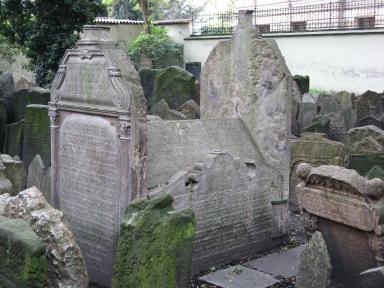Ma‘aneh lashon (Expression of the Tongue)
Anonymous
1615
Prayer on Visiting the Grave of a Mother
Peace unto thy beautified and pious soul, beloved and affectionate mother, who hast given me birth, and who hast reared me. Thou who hast loved, fostered, and cherished me, and who hast endured much suffering for me all the days of thy existence. Thou, whose maternal care has been unceasingly devoted to my happiness, whose eye so ardently watched over my physical and mental development. But alas! since thou didst go the way of all flesh, I find nowhere a guide like unto thee. I therefore have strengthened myself on my way, and proceeded to the field of weeping, until I came to the house of my mother, and to the chamber of her who bore me. And lo! there I behold thine earthly remains, wrapt in the sleep of death, whilst thy soul has soared heavenwards, and I exclaim, “Peace be unto thy soul, and may thy repose be in glory, thou blessed of women! May continually be verified in thee the promise, Arise, shine, for thy light is come, and the glory of the Eternal is risen upon thee.”
But I, thy servant, turn unto thee, that thou mayest invoke upon thy [son] [daughter] the tender mercies of God, that He may vouchsafe to hear the voice of my supplication, when I say, O Thou awfully sublime and holy God! extend Thy forgiveness, pardon my transgression; and let Thine ineffable attributes prevail! May He who establishes peace in His high heavens be gracious unto us, as in time of old. May He from His celestial seat grant me daily food and sustenance, and not be silent unto my tears, when in distress I call upon the Eternal as a poor and needy one. May He be gracious unto me and bid His benign messengers, “Redeem him from going down into the grave. May his bread not fail, nor should he see corruption.” Grant that I may be worthy to behold children and children’s children attached and devoted to Thy sacred laws, to perform Thy commandments, to walk in the path of uprightness, and be adorned with the crown of a good name, free from sin and pure from guilt.
May thy pious soul rest in calm and quietude in the garden of Eden, in the circle of the pious and righteous mothers in Israel. Mayest thou be deemed worthy to rise to everlasting life, in fellowship with all those pious, virtuous, and godly daughters, to stand for thy lot at the end of the days. May God please to do so. Amen.
Credits
Published in: The Posen Library of Jewish Culture and Civilization, vol. 5.


![detail: Burial Society Banquet Glass from Prague, 1713]. Glass for a burial society’s Annual Banquet Glass cup etched with Hebrew text and image of group of people walking.](/sites/default/files/styles/embedded_image_sm_1x/public/images/vol05/Posen5_blackandwhite176_color.jpg?itok=stGLXLJf)


